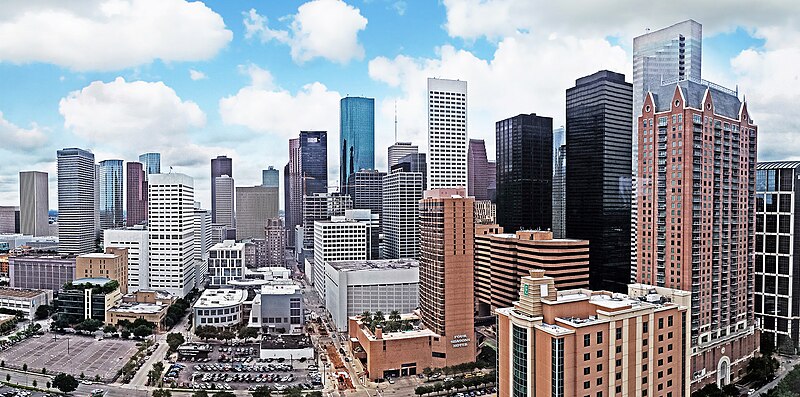I recently watched Interesting Times, a film produced by Rice University’s Kinder Institute for Urban Research presented by sociologist Dr. Stephen Klineberg. It is about what we can learn from sociological surveys taken over the past thirty years in the city of Houston. I must say I was absolutely captivated by Dr. Klineberg’s narrative as he interpreted three decades worth of data with Houston’s flourishing in mind.
 If you are considering planting a church, watch this film and see why Houston should be on your radar. If you are planting a church in Houston or already pastor one in the city, then this short film is a must-watch. If you don’t know anything about Houston, watch and see why this city is maybe more unique than you think.
If you are considering planting a church, watch this film and see why Houston should be on your radar. If you are planting a church in Houston or already pastor one in the city, then this short film is a must-watch. If you don’t know anything about Houston, watch and see why this city is maybe more unique than you think.
Some statements (adapted) or stats from Dr. Klineberg which stood out to me:
- “The blue collar path to economic security has disappeared. Gone forever is the opportunity for a young man or woman to graduate from an American high school, [get a job] and expect to make a middle class wage. If you are doing a job that I can train a third world worker to do for less…I won’t pay you more for that job. … What you earn depends on what you have learned in way that has never been as true as it is today.”
- The future source of Houston’s wealth will not be found in oil-dependent energy commerce but in something to do with bio-tech. Houston has the largest medical complex in the world. 1oo,ooo people working. 28,000 doctors. Major medical research industry, leading nano-technologists at Rice, and superconductivity at University of Houston makes a powerful composition for bio-nano-tech, bio-nano-info-tech, and the like. Therefore, the source of wealth for Houston in the 21st century will have to do with attracting the best and the brightest people in America working at the cutting edge of knowledge.
- The Quality of Life Coalition is a joint venture to harness public and private monies to plant 1,000,000 trees in the city during the next 20 years. It also aims to tear down the billboards and landscape the freeways as well as transforming the many bayous in Houston to become linear parks so that Houston might become the green place like it once was. This emphasis is essential for a pro-growth agenda for the city.
- Houston is the most sprawling, least dense city in America. It is the most auto-dependent city in America.
- Houston has the 2nd largest port in the country making it a world center for trade and commerce in the global economy.
- No city has been transformed as fully, as completely, as suddenly, as irreversibly as Houston, Texas. What began as a bi-racial, Southern city led by Anglos has, in the space of the last 30 years, become one of the most ethnically and culturally diverse cities in the country. Since the collapse of the oil boom of the 1982 we have moved to a city of non-Anglo migrants.
- By the year 2000, 3.4 million people live in Harris County. All are minorities. No majority ethnicity. In 2010, 41% are Latino and only 33% Anglo. This is a remarkable, fundamental transformation.
- Of people surveyed in Harris County, those who were 65+ in age were 70% Anglo while those under 30 in age made up 78% non-Anglo. Of the 203,000 children enrolled in HISD, 62% are Latino, 27% are African American. Incidentally, they are the two groups most likely to be living in poverty. Of those 203,000 students, 80% are in reduced cost or free lunch programs.
- Every business in Houston is going to figure out how to capitalize on the burgeoning diversity of the city or find it harder to grow their business in the 21st century unfolds.
- The new immigration into Houston (and American as a whole) is unprecedented in two ways. First, it is non-European. Second, it is remarkably bifurcated. One group is coming in with high education and income background while the other are strikingly lacking. Asian and African immigrants into the city bring with them great credentials. For example, 61% of Asian immigrants to Houston with a college degree (compare with just 47% of U.S.-born Anglos) while 50% of Latino immigrants don’t even have high school degrees.
- This ethnic transformation can be the greatest asset Houston could have as it positions itself in the global economy…or it could tear us apart by being a major liability, reducing our competitiveness in the global economy, and producing an under-class group of urban citizens.
It’s easy to see, as a pastor of a church-planting church, the importance of this information. I hope you see it too. We can reach the world for the gospel by reaching Houston. May we be a blessing for the city as God has blessed us in Christ.

2 thoughts on “The Houston We Were, We Are, and Will Be”
Hmm…
There are a number of ways in which you can improve a hillside garden,
it is all a matter of imagination and knowing what problems are likely to affect you.
Therefore, while selecting your service provider you should be looking for someone
who could understand exactly what you want and work on making it.
Article Source: Halper has a passion for landscaping and Houston Landscape Design.